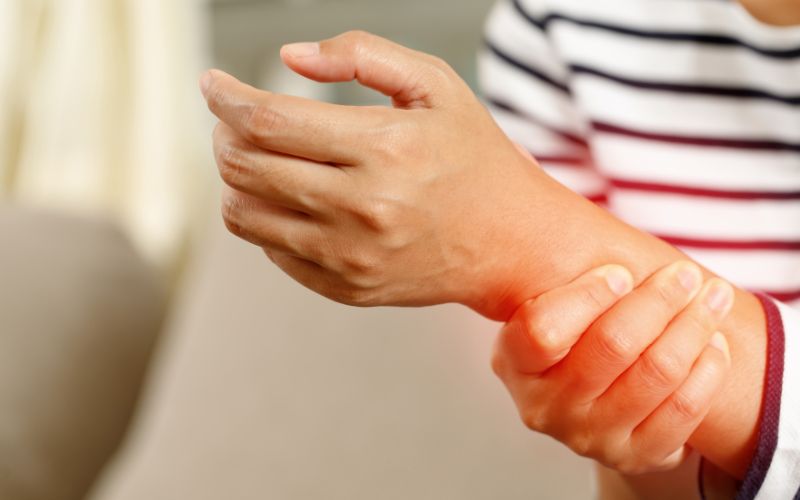
Why Do My Hands Cramp and Lock Up? Causes and Solutions
Sometimes, hand cramps occur and hands get locked up. This can be frustrating, painful, and concerning. Whether it's a fleeting moment of discomfort or a recurrent problem, this issue affects many people for various reasons. Such occurrences range from mildly inconvenient to significantly more disruption in everyday activities, especially when they happen frequently or with severity.
This article will address common hand cramps and lockups, providing practical solutions and preventive measures to relieve this condition.
What Happens When Hands Cramp And Lock Up?
Hand cramps constitute involuntary muscle contractions or spasms that cause stiffness or pain. This can be anybody amongst the hand muscles, but the most commonly affected are small muscles between the bones and those controlling your fingers. These spasms are usually sudden and intense and can temporarily disable movement of your hands.
Hand locking occurs when your hand or fingers curl or stiffen and cannot extend freely. Your hand may feel stuck in a certain position.
These symptoms may come and go.
Hand Cramps And Lockup: Causes
A multitude of reasons can cause hand spasms or lockings. Therefore, it is important to understand what lies beneath such situations to determine proper treatments and preventive measures. Some of the most common causes are as follows:
Dehydration and Electrolyte Imbalance
The most common cause of muscle cramps is dehydration. Water plays a critical role in muscle function, and if one is dehydrated enough, it might cause muscle irritability.
Low levels of calcium and magnesium can trigger muscle spasms and hand cramps. These minerals regulate the muscles and nerve signalling; without them, your muscles may convulse with involuntary contractions. That is why athletes or those who sweat a lot when exercising or experiencing hot weather tend to experience cramps more often.
Overuse and Muscle Fatigue
The hands and fingers are used extensively during the day, draining the hand muscles, which could result in cramps and permanent locking. This is rampant among people who use their hands in repetitive activities, including operations performed on a keyboard or computer, working on tools, playing musical instruments, and even hobbies such as knitting.
When muscles are overworked or tired, they lose the capacity to relax and reset, causing spasms or cramps. Conditions like tendonitis or carpal tunnel syndrome develop due to repetitive strain, contributing to hand cramps.
Medical Conditions
Arthritis: Osteoarthritis and rheumatoid arthritis are two common conditions that affect the joints health and tissues in the hand. As either of these conditions progresses, the hand and fingers may develop stiffness, redness, inflammation, or pain, which can cause cramping or locking.
Carpal Tunnel Syndrome: This is where the median nerve from your forearm into your palm compresses at the wrist, causing severe pressure on the hand that might cause pain, tingling, numbness, and even cramps.
Diabetes: Poorly controlled blood sugar damages nerves through diabetic neuropathy. It causes sensitivity, mainly in the hands and feet, that leads to muscle weakness, cramps, or pain.
Multiple Sclerosis (MS) and Other Neurological Conditions: MS and other comparable neurological conditions can disrupt how the brain and nerves communicate with muscles. Those afflicted by these conditions may experience spasms or cramping in their hands.
Vitamin and Nutrient Deficiencies
Some vitamins and nutrients are required to maintain well-toned muscles, and deficiencies of these vitamins and minerals cause cramping and locking up of the muscles. Examples include:
Vitamin D: Vitamin D enhances calcium input, allowing the muscles to run. Vitamin D deficiency decreases calcium absorption in the body; therefore, muscle cramps occur even in the hands.
B Vitamins: B vitamins, mainly B6 and B12, help nerves function. A deficiency of B vitamins leads to nerve deterioration, and body muscles become weak and crampy.
Medications
Certain medications, such as high blood pressure, diuretics, cholesterol-lowering statins, asthma, and other respiratory medications, may cause muscle cramps. Some individuals have developed hand cramps while on these types of medications. If you experience recurrent hand cramps and are taking any of the above types of medications, check with your physician about alternative treatments.
Changes in Temperature
Cold weather can make muscles cramp. This is especially true for hands with arthritic or poor circulation. Cold weather tends to reduce blood flow to the hands, making them stiff or feeling locked up. Warming up hands and maintaining flexibility could prevent cramping in the cold.
Symptoms Of Hand Cramps And Lockup
The symptomatology of the causative hand cramp and locking varies. Some common symptoms are the following:
- Sudden, sharp pain or discomfort in the muscles of the hand or fingers.
- Muscle contractions in seconds to minutes
- Stiffness or inability to move the affected hand or fingers
- Tingling or numbness of the fingers frequently accompanies nerve conditions.
- Pain or swelling in the hand or wrist, especially if the spasm is connected with overuse or injury.
Remedies To Reduce The Risk And Treat Hand Cramps
If cramps or spasms in the hands or wrists have become a recurring problem, add an organic essential mineral blend and vitamins to your diet. However, other ways exist to manage the symptoms and reduce their occurrence. Here are some strategies that can be used:
Hydrate: A simple way to avoid hand cramps is to ensure sufficient water intake daily. Drink at least 8 glasses a day, and more if your physical activities are intense or you live in hot climates.
Stretch and Strengthen: Regular stretching and strengthening exercises improve flexibility and may reduce the chances of muscle cramps. Simple hand stretches—such as gently bending and straightening your fingers, making a fist, and stretching your palm—can keep your hand muscles limber and likely to cramp.
Maintain proper ergonomics: If you do lots of work or hobbies using your hands, ensure your workstation and hands are properly positioned. For example, keep your wrists neutral so your hands are placed below your elbows when typing. Even constant breaks to stretch the hands and fingers prevent overuse.
Heat or Cold: A warm compress may soothe tight muscles and increase blood flow for hand cramps related to arthritis or overexertion. In other situations, should an acute injury or irritation cause the cramp, cold treatment may help reduce swelling and dull the pain.
Consider Nutritional Supplements: Magnesium, calcium, or B vitamins may be beneficial if your cramps are most likely due to a vitamin or mineral deficiency. Supplements like Vital Earth CAL-Mag liquid may answer the imbalance in nutrients that may be the reason for muscle cramps and hand stiffness. Before you start supplements of any type, clear this with a healthcare professional to ensure you have the right supplement for your needs.
Massage and Relaxation Techniques: Massaging your palms can improve blood circulation and lower muscle tension, reducing muscle cramps. Some relaxation techniques, such as deep breathing and meditation, can help manage stress, which may cause tight muscles and lead to cramps.
When To Seek Medical Help
Mild hand cramps may often be present, but recurrent hand cramps are not typical. When the hand cramps or lockups are recurrent, severe, or frequent, or you experience other symptoms like numbness, tingling, or weakness along with the cramps, you should consult a doctor. These may be signs of an underlying problem, like carpal tunnel syndrome, arthritis, or a nerve disorder, that would require medical assessment.
Conclusion
Hand cramps and lockups can be sore and sometimes inconvenient, but knowing what may cause the problem can lead to successful treatment and preventive measures. Whether it is from dehydration, overuse, or an underlying medical condition, you can do some things to relieve the discomfort. Keeping hydrated, regularly stretching, and having a balanced diet full of nutrient intake may help avoid the possibility of hand cramps. However, if they are ineffective or the condition worsens, getting some medical advice could be the next step toward keeping your hands healthy and responsive.
Frequently Asked Questions
What Does It Mean When Your Hands Cramp and Lock Up?
If your hands stiffen and lock up, it may be due to dehydration, muscle spasms, or nerve-related problems. Other causes of hand cramps could include stress, overuse, poor circulation, arthritis, medication side effects, carpal tunnel, or an imbalance of electrolytes.
What Deficiency Causes Hand Cramps?
Other possibilities include a lack of vitamins or an imbalance of electrolytes, causing hand cramps. Muscle fatigue, dehydration signs, nerve compression, poor circulation, overuse injury, stress response, or medication side effects could be the cause. Do consider getting checked out by your physician.


